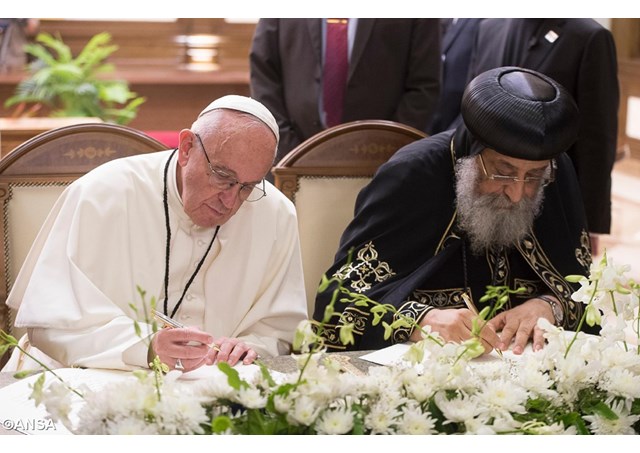
Catholic-Coptic joint declaration: an important ecumenical milestone

(Vatican Radio) As Pope Francis prepares for his next pastoral visit to Portugal on Friday, analysts are reflecting on the important ecumenical and interfaith fruits of his historic visit to Egypt.
Among the most powerful images of his brief trip to Cairo were his warm embrace with the Grand Imam of Al Azhar, Sheik Ahmed Al-Tayeb and an ecumenical encounter at a Coptic church where 29 people died in a suicide bombing last December. The Pope stood in prayer in front of the bloodstained wall, lighting a candle beside photos of those who were killed in the attack.
Just before the ecumenical prayer service at the church of Saints Peter and Paul, Pope Francis and the Coptic Orthodox leader Pope Tawadros II also signed a joint declaration, reaffirming their shared roots in faith and stating their desire to end the practice of re-baptising converts. The statement also calls for a common translation of the Lord’s Prayer and a common date for the celebration of Easter.
To find out more about the significance of this declaration, Philippa Hitchen spoke to the emeritus rector of the Pontifical University of St Anselm, Benedictine Father Mark Sheridan, who serves on the commission for dialogue between the Catholic and the Oriental Orthodox Churches….
Listen:
Fr Mark believes that, as well as being very important for the broader ecumenical dialogue, it’s also good for the Catholic and Orthodox Churches in Egypt, because it seeks to remove “a problem which caused a lot of friction in the past”.
The re-baptising of converts was not carried out by all Coptic bishops, he says, but “a significant group did”. The practice began under the previous Pope Shenouda III, partly out of a fear of proselytising. “There was good reason for that”, Fr Mark says, but there have since been declarations that the Churches “do not engage in proselytism”, and this removes another point of friction.
Asked about the difficulties of implementing the spirit of the new declaration, Fr Mark says: “It’s the same as in the Catholic Church: Pope Francis has set out a rather clear policy in many areas, but there’s resistance against him as well”.
He says the document is of importance for bishops, in particular and some of the clergy, while many people on the street “don’t understand the difference” between Catholics and Orthodox.
Progress in the dialogue is achieved, Fr Mark believes, when “people at the top are on the same wavelength”. Within the dialogue between Catholics and Oriental Orthodox, he says, there are excellent relations among the majority of participants, who have become “friends after so many years”.
There is significant agreement, Fr Mark continues, on many issues, including the recognition of martyrdom, and the search for a shared date to celebrate Easter. At grass roots level, he says, relations between Catholics and Oriental Orthodox are often much closer than at leadership level.
| All the contents on this site are copyrighted ©. |


